Amazing in every way, dogs are man’s best friend and a source of unending delight. It is our duty to look out for the health and happiness of our pets. But if you’re a first-time dog owner, you should know that it’s not always easy to keep them healthy and happy. Their eating habits, exercise requirements, and personality traits are just a few factors to think about.
This article was made in response to the many questions pet owners have about their canine companions. With hopes of providing you with the information, you need to be a responsible dog owner, we believe that all owners, whether new or seasoned, will gain insight from this.
For the purpose of answering these questions, we’ve consulted with professionals who we trust to give us accurate information. Professionals, who have spent years caring for and improving the lives of dogs in veterinary, training, and other capacities. With the information they provided, you’ll be able to provide better care for your pet.
The purpose of this article is to address some of the most frequently asked questions by dog owners. Taking the best possible care of your pet is a top priority for you, and we aim to equip you with the knowledge to do just that.
Whatever your dog-related concerns may be—what they should eat, how they should be trained, or what to do if they get sick—we’ve got you covered. Insightful and useful information is our goal for this article. Your dog’s health and happiness depend on you, so it’s important to learn all you can about providing the best care possible. So, we have made two sections in this article:
>5 Most Commonly Asked Questions About Dogs<
> 5 Most Uncommonly Asked Questions About Dogs<
Without any further ado, let’s jump onto the most common and uncommonly asked questions now. We will begin with the 5 most commonly asked questions about dogs.
5 Most Commonly Asked Questions About Dogs
1 – Why is my dog’s nose dry?

Answer – There are a number of potential causes for a dog’s nose to be dry; the context and other symptoms will help determine if this is cause for concern. Among the most prevalent causes of a dry nose are:
Dehydration – If your dog isn’t getting enough water, dehydration can cause its nose to dry out. In hot weather or after strenuous activity, it is especially important to make sure they have access to clean water at all times.
Allergies – Dogs can be sensitive to certain foods or environmental allergens (such as pollen, dust, or mold). Nasal irritation and dryness can be brought on by allergies. If you think your dog has allergies, it’s important to see a vet.
Weather changes – Variations in temperature and humidity can cause your dog’s nose to dry out. Moisturizers and balms that are safe for pets can be very helpful.
Illness – An early indicator of illness or infection, d., is a dry nose. Talk to your vet if you also notice signs like depression, loss of appetite, or discharge from the nose.
Natural variation – Some dogs’ noses are just naturally drier than others, so having a dry nose might not always mean there’s something wrong.
2 – Why does my dog eat poop?
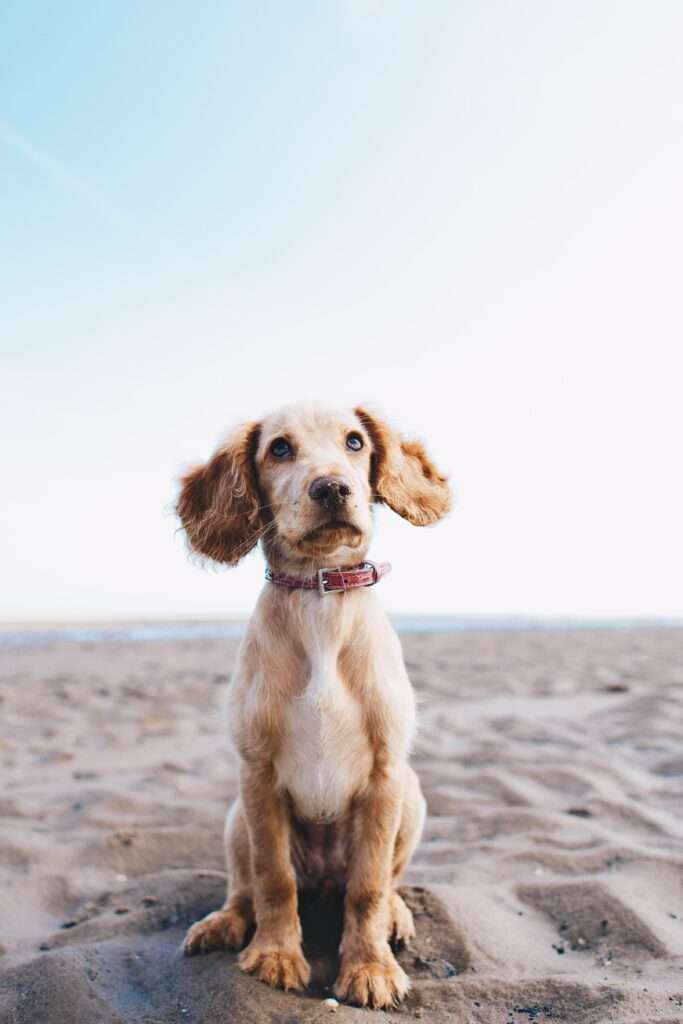
Answer: Well, there are various reasons that can be the cause of this due to which some dogs may resort to coprophagia. For instance:
Lack of nutrition – If a dog’s diet is deficient, it may try to get the nutrients it needs from other places, including its own waste. Feed your dog a healthy diet that takes into account its age, size, and level of activity.
Boredom – When dogs don’t have enough to do, they may resort to eating their own waste. Keep them active and stimulated mentally and physically with toys, games, and outings.
Seeking Attention – If your dog has learned that eating poop gets a reaction from you, it may be doing so as a way of seeking attention. Reward appropriate behavior instead of scolding or focusing too much on bad ones when this occurs.
Instinctual behavior – Some dogs, especially puppies, may eat feces out of curiosity or as a way to help keep their territory clean. d. Instinctual behavior. As they get older and learn what is and isn’t socially acceptable, they may stop acting this way.
Medical conditions – Coprophagia can be triggered by medical conditions like digestive problems or parasitic infections. Ask your vet for advice if you’re worried.
3 – Why does my dog stare at me?
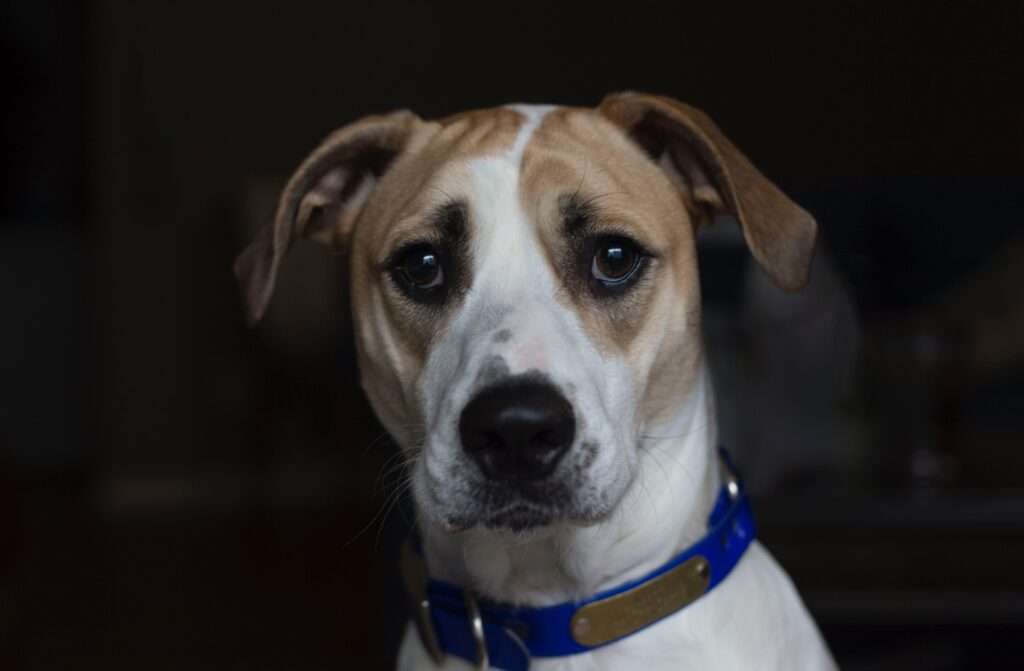
Answer – Have you noticed your dog giving you a side eye? Well, there is no straight answer to that. There could be multiple reasons why your dog stares at you. We have jotted down a few common ones below:
Why does my dog stare at me creepy? It’s natural to feel uneasy when your dog stares fixedly at you, but remember that they’re probably just trying to communicate with you or observe your behavior. Dogs are highly intelligent social creatures who gain a great deal of knowledge from observing their human companions and the world around them. Pay close attention to your dog’s body language and the surrounding situation to get a better read of what they need.
Why does my dog stare at me when I sleep? While you snooze, your dog may stare at you because he or she is acting as a guardian and wants to make sure you’re safe. Dogs are pack animals and may display protective behaviors toward their human family. Your dog may be waiting for you to wake up so that he or she can have some sort of interaction with you or request something from you, such as food or a bathroom break.
Why does my dog stare at me at night? There could be a number of reasons why your dog is staring at you in the middle of the night. If your dog has anxiety or fears the dark, it may be looking for reassurance from you. They could be trying to express a desire to eat or go outside, for example. Dogs have superior night vision compared to humans, so they may be picking up on details in their surroundings that you’re missing.
Why does my dog stare at me without blinking? If accompanied by other dominant behaviors, a dog’s prolonged, unblinking stare could be an attempt at dominance display. It could also be a sign of interest, intense thought, or an attempt to decode your feelings and actions. The best way to understand your dog’s motivations is to pay close attention to both the situation and their overall body language.
Why Does My Dog Stare at Me When He Poops? Dogs feel vulnerable when they defecate, so they may stare at you for comfort or protection. They want to make sure you’re alert and watching out for danger, so they won’t let your gaze wander. As your dog relies on you to protect them in a precarious situation, this behavior can also serve as a sign of trust and closeness on your dog’s part.
4 – What does a dog howling mean?
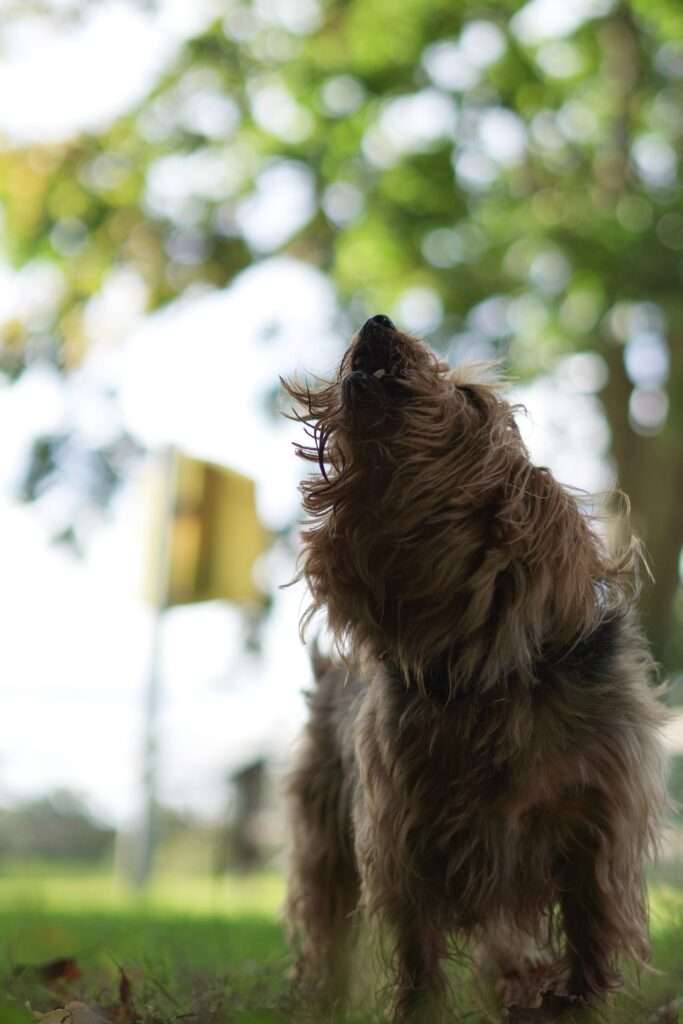
Answer – It is important to consider the dog’s environment and other behaviors when trying to interpret its howls. Here are examples of typical triggers for howling:
Communication – Howling is a canine’s first language and serves a variety of purposes, including but not limited to calling other dogs, letting them know where they are, and making themselves known to other animals.
Loneliness/separation anxiety – When dogs are lonely or anxious, they may howl. This could be an attempt to reunite with their owner or pack.
Pain or discomfort – When a dog is in pain or otherwise uncomfortable, they may howl to let you know how they’re feeling. Your dog’s pain levels can be evaluated by your vet if you suspect discomfort.
Response to sounds – Dogs may howl in response to the sound of a siren, a musical instrument, or even the howling of another dog. This is typically an instinctive action because it is similar to the way their wild ancestors communicated over great distances.
Howling for attention: If a dog is rewarded for howling, it may begin to do so on its own accord (either positively or negatively). Howling can be discouraged when the dog is ignored and given treats for being quiet.
5 – How often should you bathe a dog?

Answer – The regularity of how often to bathe your dog depends on a number of factors, including the dog’s breed, coat type, activity level, and the presence or absence of any skin conditions. Once a month is a good benchmark for giving your dog a bath. But there are always exceptions to the rule:
Short-haired breeds with smooth coats (such as Beagles or Boxers) typically need fewer baths because their coats don’t trap dirt and debris as easily as longer-haired breeds.
Water-repellent or double-coated breeds (such as Golden Retrievers or Huskies) benefit from less frequent bathing because the natural oils in their coat protect their skin and fur from drying out.
Curly or long-haired breeds (like Poodles or Shih Tzus) might need more frequent baths to avoid mats and tangles.
If your dog has a skin condition or allergies, you should get advice from your vet on how often and what kind of products to use when bathing him.
Overbathing your dog can cause its skin and fur to lose their natural oils, which can exacerbate dryness, irritation, and other skin problems. Maintaining a clean, healthy coat between baths is easier with regular brushing.
5 Most Uncommonly Asked Questions About Dogs
Now that we are done with the 5 most commonly asked questions, let’s move on to the 5 most uncommonly asked questions. Some of these might make you laugh but people are asking these questions!
1 – Why does my dog bite his pee-pee?

Answer – There are a few possible explanations for why your dog is biting or licking their genital area so much. Keep an eye on your dog and see a vet if you have any concerns or if the problem persists. Some reasons could be:
Infection or inflammation – Urinary tract infection (UTI) or inflammation in the genital area can cause your dog to bite or lick at the affected area in an effort to relieve pain. Other symptoms of these infections may include the need to urinate frequently, the presence of straining while urinating, or the presence of blood in the urine.
Allergies – Environmental and dietary allergens can both irritate your dog’s genital area and cause itching and scratching all over its body. Dogs, in an effort to alleviate their pain, may lick or bite at the affected area.
Parasites – Your dog may bite or lick at its skin if it is itchy from a parasite like a flea, tick, or mite. To keep your dog safe from parasites, a consistent parasite prevention routine is essential.
Skin conditions – Itchiness, redness, or irritation in your dog’s genital area could be a sign of a skin condition like dermatitis or fungal infection. It’s possible that these problems will need to be treated medically.
Foreign objects or debris – Sometimes, your dog may irritate their genital area by biting or licking at it because a foreign object, like a grass seed or a small piece of debris, has become lodged there.
Anxiety or stress – Anxiety and stress can cause some dogs to exhibit obsessive behaviors like biting and licking. Stressful behaviors can be reduced if the cause is determined and removed for your dog.
Hormonal or medical issues – In some cases, your dog may bite or lick its genitalia because of a medical condition or hormonal imbalance, or disorder. If you want to make sure there are no underlying health issues, your vet should be consulted.
Consult your vet for a thorough examination and diagnosis if your dog is repeatedly biting at their genital area. They can help you figure out what’s bothering your dog and give you advice on how to treat it or manage it so that it doesn’t get worse.
2 – Why does my dog bury his head in the couch?
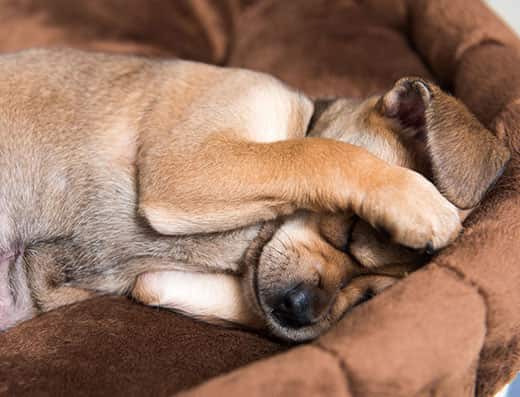
Answer – Dogs’ natural instincts, comfort, or emotional needs may lead them to bury their heads in the couch. The most frequent ones are:
Seeking comfort and warmth – Dogs may bury their heads in the couch to get some much-needed warmth and comfort. They may feel safe and secure in this enclosed area, which may remind them of times spent denting or cuddling with their littermates in the wild.
Anxiety or stress – When dogs experience anxiety or stress, they may try to comfort themselves by burrowing their heads into soft surfaces, such as a couch. To reduce your dog’s anxiety, you should first determine what is triggering it.
Scent-seeking – Dogs have a keen sense of smell, so they may stick their noses in odd places like the couch to investigate the traces of their human or canine family members. This action makes them feel safer and more at home in their surroundings.
Playing or hiding – As part of a playful behavior or during a game of hide-and-seek with their owners, some dogs may bury their heads in the couch. Your dog may find this a pleasant and risk-free way to explore their surroundings and burn off some steam.
Seeking attention – Your dog may be trying to get your attention by burying its head in the couch. They may continue doing it as a means of communication or affection if they’ve learned that it works.
Medical issues – Some dogs may hide their heads in the couch because they are experiencing physical discomforts, such as an ear infection, toothache, or headache. Get your dog checked out by a vet if you notice any other symptoms or think it may be in pain.
You can learn your dog’s motivations by studying their general behavior and the circumstances in which they act. Talk to your vet if you’re worried about your dog’s behavior and think it could be due to a health problem.
3 – Why does my dog bite my nose?

Answer – Dogs’ reasons for nipping or biting at a person’s nose can range from playful to communicative to affectionate. The most frequent ones are:
Playfulness – Dogs are playful creatures, and it’s only natural for them to explore the world and interact with other dogs through nipping and mouthing. Sometimes dogs will bite as a playful gesture, either to start playing with you or to show their excitement.
Affection – Some dogs will nip or mouth at their owner’s nose as a sign of affection. Because they are reaching out to you in a way that is comfortable and familiar to them, this may be an indication of their trust and love for you.
Attention-seeking – If your dog has learned that nipping at your nose causes you to react favorably, it may continue doing so as a way to get your attention. Nipping should be discouraged and healthy alternatives to attention-seeking behaviors should be encouraged by responding calmly and redirecting their behavior.
Exploration – Puppies and adult dogs alike use their mouths as tools for discovery and education. As a means of exploring and learning about their environment, they may mouth or bite at various things, including the owner’s nose.
Dominance or assertiveness – Dogs sometimes nip at people’s noses to show who’s the boss or to establish their place in the pack’s pecking order. Setting firm limits and positively reinforcing appropriate actions are effective ways to address this less frequent behavior.
Setting limits and providing consistent training will help prevent your dog from biting you on the nose. When they start to nip at your nose, distract them with some appropriate chew toys or another activity. If the problem persists or escalates into aggression, you may want to seek the help of a dog behaviorist or trainer.
4 – Why does my dog step on my feet?
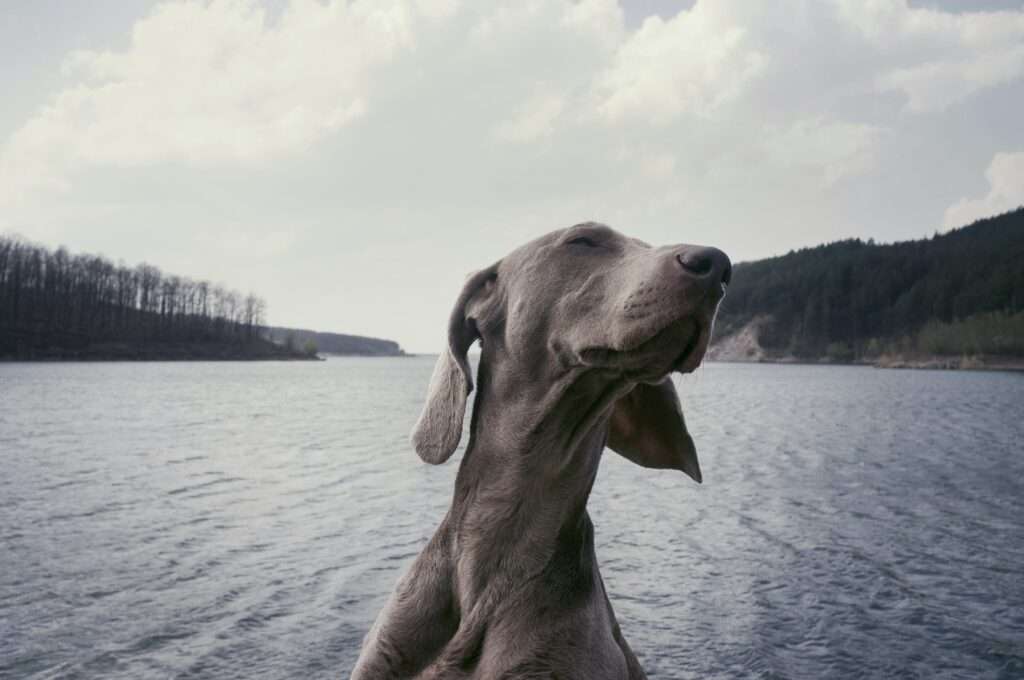
Answer – There are many possible causes for a dog to step on its owner’s feet, but it usually has something to do with the dog’s natural instincts, emotions, or social behaviors. The most frequent ones are:
Seeking comfort and security – Dogs will nudge against your feet if they want to be close to you and feel safe. They may experience an increase in feelings of safety and belonging as a result of this behavior.
Asserting dominance or possession – Sometimes dogs will step on your feet as a way of showing dominance or claiming territory. This behavior is a signal of their status within the family or an indication that you belong to them.
Attention-seeking – To get your attention or play with you, your dog may try to trip you by stepping on your feet. They might do it again because they’ve learned that it gets a reaction from you, whether it’s positive or negative.
Affection – When your dog steps on your feet, it may be a sign of affection because it is a physical expression of their love and attachment to you.
Herding instincts – Some dog breeds, such as Border Collies and Australian Shepherds, are bred specifically for their herding instincts. Your dog may be trying to “herd” you or keep you close by stepping on your feet.
Anxiety or stress – Anxiety and stress can cause dogs to step on their owners’ feet as a means of seeking comfort and reassurance. If you can figure out what’s making your dog anxious, you can take steps to make him feel better.
Pay attention to the situation and your dog’s body language to manage or redirect his behavior. In order to reinforce the proper behaviors, it is necessary to set limits and provide consistent training. Seek the advice of a qualified dog trainer or behaviorist if your dog’s behavior ever becomes troubling.
5 – Why does my dog want to lay on me?

Answer – There are many reasons why dogs might want to lay on their owners, but it usually has to do with showing love, feeling safe, or bonding with them. The most frequent ones are:
Affection: When your dog lays on you, it may be a sign of affection because it is a physical manifestation of its love and attachment to you. They might like the feeling of being close to and protected by their favorite human.
Comfort and security – Dogs often choose to cuddle up next to their owners for comfort and safety. They may feel more at ease and secure in their surroundings as a result of close physical contact.
Social bonding – Your dog may choose to lay on you as a means of strengthening the social bond between you two. Because dogs are social animals, physical contact is crucial for establishing and maintaining friendships.
Body warmth – Dogs love to cuddle up next to their owners when it’s cold outside because they can feel the warmth from our bodies. This is a great strategy to employ when it’s cold outside or if your dog is feeling chilly.
Seeking attention – Your dog may choose to lay on you if he or she is trying to get your attention or interact with you. They may continue to use this mode of communication if they have learned that it results in some kind of reaction, positive or negative.
Anxiety or stress – When dogs are anxious or stressed, they may try to cuddle up next to their owners for some reassurance and comfort. If you can figure out what’s making your dog anxious, you can take steps to make him feel better.
The two of you can share a soothing and bonding experience by letting your dog lay on you. If you’d rather set limits or discourage the behavior, you can redirect your dog to their bed or a special blanket and praise them when they go there instead.
